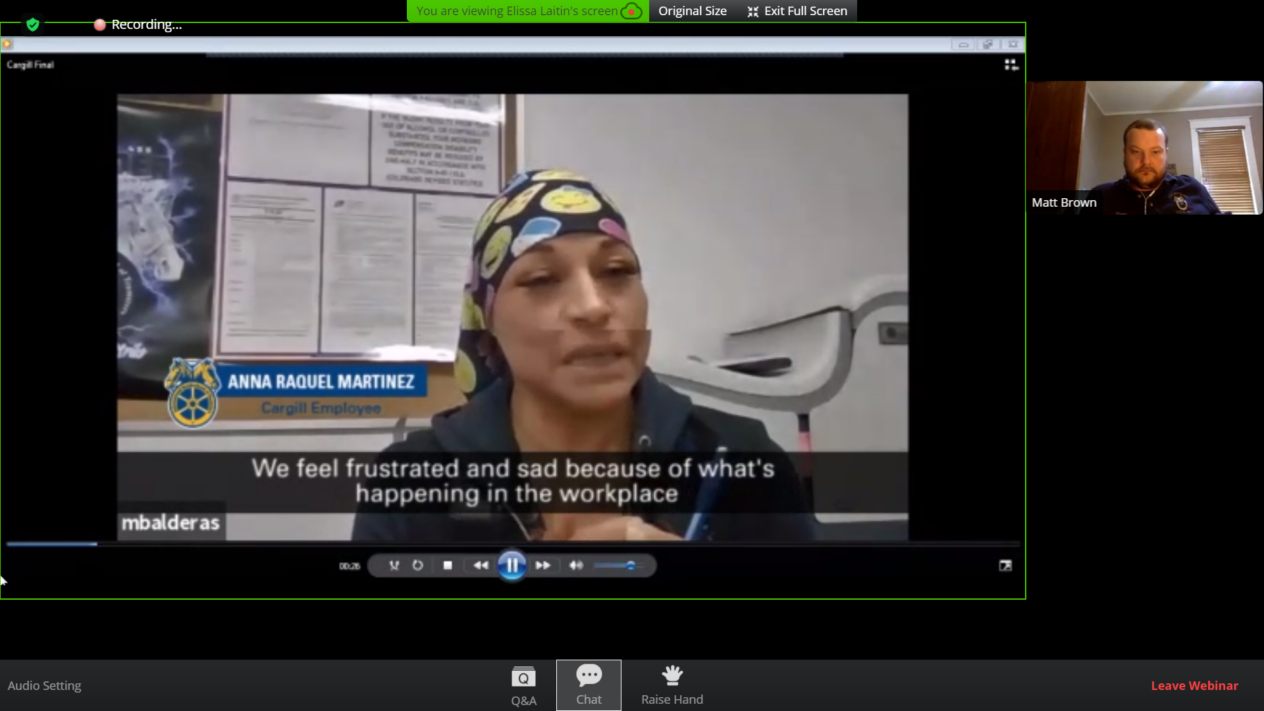At Netroots, Teamsters Talk About Improving Workplace Safety

The coronavirus pandemic will continue to disproportionately affect millions of workers in the food supply chain unless all interested parties come together to institute a plan that emphasizes protective measures, testing and proper treatment, worker allies and academics said.
Speaking during a session of the Netroots Nation conference being held virtually in mid-August, panelists said those working in processing plants, warehouses and grocery stores continue to risk their lives and their livelihoods by showing up at unsafe workplaces that too often have people working too close together and with a lack of protective spaces or equipment.
The Teamsters have seen this problem firsthand with its members who work for the Cargill meat processing plant in Fort Morgan, Colo., where many have become sick and even died.
“These companies are driven by profit,” said James Jones, President of Teamsters Local 667 in Memphis, Tenn. “That’s why we say don’t put profit over people.”
One way to fight back against the continue spread of COVID-19 at worksites is to change how companies are dealing with the virus. Keeve Nachman, an associate professor in the Department of Environmental Health and Engineering at Johns Hopkins University’s Bloomberg School of Public Health, said researchers there have come up with a plan to help curb the coronavirus.
Called Shield, Test, Trace and Treat (STTT), Nachman stated the plan would do a better job of protecting a vulnerable workforce that already faced numerous challenges on the job.
“There is no one silver bullet,” he said. “Protection of workers really requires drawing from all four steps. And more resources need to be made available to implement these steps.”
The shield portion looks at engineering controls and the increased use of personal protective equipment (PPE) to minimize infections. By creating barriers, slowing line speeds and staggering work shifts, companies can create a safer environment.
On testing, there needs to be a greater focus on catching those who are asymptomatic or pre-symptomatic. Regular testing should be ramped up to identify workers before they spread the virus.
With tracing, there is a need to identify those who have been exposed to sick workers so they can be quarantined. Unions and local government need to be involved so it is done properly, and in a way that protects undocumented workers so they will participate.
And treat ensures that when workers are sick, they are sent home. But workers need access to health care and paid sick time so they can stay home but still cover their basic living needs.
Matt Brown, a strategic campaign coordinator with the Teamsters, said Congress needs to create a grant program so STTT can be implemented. He said the union has a plan to go to governors to implement labor-management panels so the proposal can be put in place. He said there is interest in several states such as California, Colorado and Virginia. But, “This is not cheap. It has a high cost.”
Already in Virginia, workers, labor activists, faith-based groups and unions came together to fight to implement worker protections. Jason Yarashes, lead attorney and program coordinator for the Legal Aid Justice Center, highlighted the work done this spring by poultry workers on Virginia’s Eastern Shore and Shenandoah Valley who took the lead in the fight, holding car rallies in both locales in late April that helped galvanize the effort. At the same time, they joined with activists to petition Gov. Ralph Northam in seeking an emergency standard, one that was ultimately granted in June.
Jones also endorsed the STTT proposal, saying that his members who work at a Kroger distribution center will continue to be at risk if nothing more is done. And those affects could be felt nationwide.
“We have to really realize how the food supply chain could be crippled, and how that would affect your daily life,” he said.